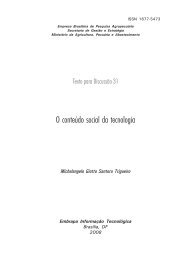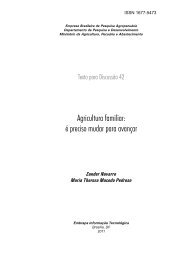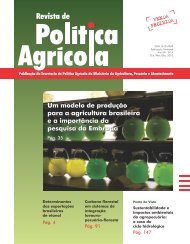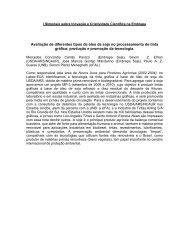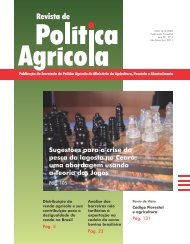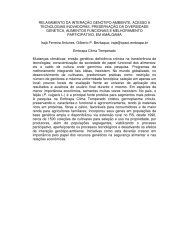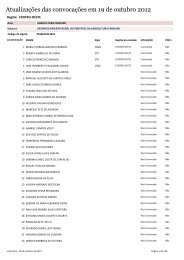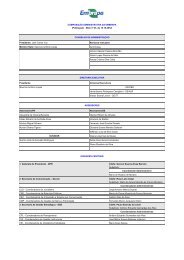Ministry of Agriculture, Livestock and Food Supply - Embrapa
Ministry of Agriculture, Livestock and Food Supply - Embrapa
Ministry of Agriculture, Livestock and Food Supply - Embrapa
Create successful ePaper yourself
Turn your PDF publications into a flip-book with our unique Google optimized e-Paper software.
The biodiesel production capacity in the Center-South is estimated at<br />
835.2-million liters p.a. by the end <strong>of</strong> 2007. At the present time there is only<br />
one plant in operation in the region, in the State <strong>of</strong> Minas Gerais, with capacity<br />
to produce 12-million liters per year. Nevertheless, the biodiesel production<br />
should grow rapidly to approximately 125-million liters p.a., since another 13<br />
units have already been built, albeit not yet commissioned. There are also<br />
several other new plants or plant expansion projects underway, whose<br />
production will total 698.2-million liters by the end <strong>of</strong> 2007 according to the<br />
<strong>Ministry</strong> <strong>of</strong> Mines <strong>and</strong> Energy.<br />
The region has very good potential to produce biodiesel from other crops,<br />
such as peanuts, sunflower <strong>and</strong> castor beans. The experiments with castor<br />
plants in the State <strong>of</strong> Mato Grosso <strong>and</strong> the research on the crop at the Instituto<br />
Agronômico de Campinas have had very satisfactory outcomes, especially<br />
with the so-called dwarf varieties, which not only are very productive in the<br />
field (up to 4 tons <strong>of</strong> castor beans per hectare), but also enable the use <strong>of</strong><br />
mechanical harvesters.<br />
In the Center-South as a whole <strong>and</strong> particularly in the states located in<br />
the Center-West Region, large extensions <strong>of</strong> farmable l<strong>and</strong> with appropriate<br />
topography <strong>and</strong> optimum climatic regularity are still available. This means<br />
that if biodiesel becomes the new business opportunity in Brazilian agriculture,<br />
the Center-South, which already accounts for almost 80% <strong>of</strong> the national fuel<br />
consumption, would have perfect conditions to exp<strong>and</strong> its production base<br />
very rapidly, as in the case <strong>of</strong> fuel alcohol.<br />
Competitiveness <strong>of</strong> soybean for biodiesel<br />
A comparative study <strong>of</strong> petroleum <strong>and</strong> soybean oil prices shows that<br />
the average price <strong>of</strong> refined soybean oil has been US$ 69.00/barrel during the<br />
last 15 years (Figure 12), which includes refining, domestic freights <strong>and</strong> other<br />
commercialization costs.<br />
A US$ 10.00 discount is considered reasonable to account for the various<br />
elements that make up the price <strong>of</strong> eatable soybean oil, as opposed to soybean<br />
oil for energy purposes, in addition to the cost <strong>of</strong> obtaining biodiesel. Thus, biodiesel<br />
becomes competitive when the cost <strong>of</strong> petroleum is US$ 60.00 per barrel, given<br />
the current conditions <strong>of</strong> technological development, managerial capacity,<br />
production scale, market size, industrial plants, capital costs, taxes, <strong>and</strong> fixed<br />
costs, among others. A consideration <strong>of</strong> the ethanol learning curve for the last 30<br />
years leads us to conclude that this cost could be substantially reduced in the<br />
medium term.<br />
89



